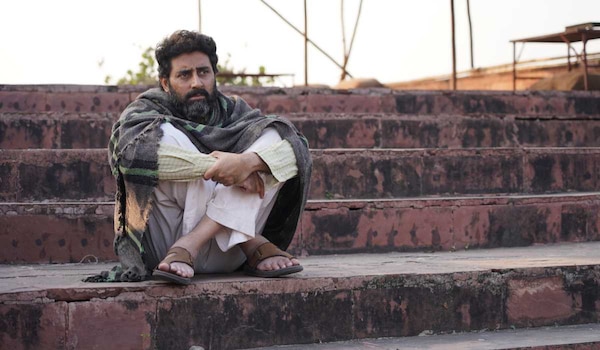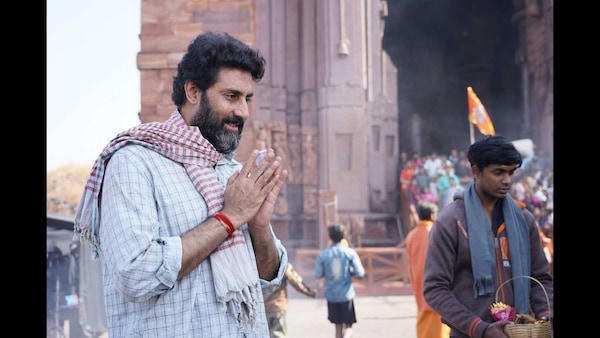Kaalidhar Laapata ending explained: Did Abhishek Bachchan's Kaalidhar get the closure he deserved?
Kaalidhar Laapata explores mental illness, betrayal, and healing through the bond between a broken man and an orphan, leading to self-worth, closure, and a hopeful new beginning.

Last Updated: 11.36 AM, Jul 09, 2025
A moving depiction of mental illness, abandonment, and the strength of the human spirit is Kaalidhar Laapata, helmed by Madhumita. In the midst of a world that has let them down time and time again, an odd pair—a troubled man (Amitabh Bachchan) and an orphaned child (Daivik Baghela)—form an unlikely but strong friendship, helping one another survive. The film begins with a subtly moving finale that reimagines self-worth, forgiveness, and closure, setting the tone for the gradual escalation of tension throughout their emotional journey.
Fall of Kaalidhar
Gravitantly portrayed, Kaalidhar is a man suffering from major depressive disorders, amnesia, and hallucinations. He used to be his family's rock, but now they want nothing to do with him. To fully manage the ancestral land, his brothers Manohar (Vishwanath Chatterjee) and Sundar (Priyank Tiwari), as well as his sister-in-law Neetu (Madhulika Jatoliya), want him physically and emotionally removed.
After doctors told the siblings there wasn't much chance for Kaalidhar's recovery, they tried poisoning him and forging his thumbprint. They then decide to leave him at the Prayagraj Kumbh Mela in the hopes that he won't be able to find his way back once that fails. However, Kaalidhar learns of their treachery and goes on the run, eventually arriving in a place named Bhojpur.
ALSO READ: Kaalidhar Laapata review: Abhishek Bachchan gets lost at Kumbh Mela, and the film in the script
Chance encounter with Ballu
Kaalidhar encounters Ballu, an energetic orphan youngster residing next to a temple who struggles to make ends meet, in Bhojpur. Although they are wary of each other at first, they eventually become close. Kaalidhar is exposed to a livelier, more carefree lifestyle by Ballu. They start crossing off items from their list of things to do, such as eating biryani, riding a bike, and acting in a play, as they go. As a result of Ballu, Kaalidhar finds hope and independence again.
After a seizure episode, Ballu starts to grasp Kaalidhar's situation as well. However, rather than withdrawing, the child adopts a nurturing and inspiring role. The emotional anchor of the film is their friendship.
Subodh joins the puzzle
At the same time, Subodh (Mohammed Zeeshan Ayyub), who works for the mela's lost and found department, becomes involved. He begins to believe that Kaalidhar may not want to be located, despite initially treating the matter as normal. The revelation of Manohar and Sundar's true objectives intensifies his empathy.
Ironically, Manohar and Sundar are pushed back into the search—not by love, but by desperation—by the fire that destroys the fake property papers. Subodh, however, feels the emotional trauma that Kaalidhar has suffered and decides not to disclose his whereabouts.
Meera and the unspoken past
Despite having previously planned to marry Meera (Nimrat Kaur), Ballu prompts Kaalidhar to reunite with her. Reuniting is a quiet yet heartfelt affair. Although Meera's personal circumstances are vague, they appear to permit a rekindling of her relationship with Kaalidhar, and she continues to feel fondness for him.
Kaalidhar eventually visits his family, but this time he intends to establish limits rather than make amends. To make sure that Manohar and Sundar wouldn't quit him without repercussions, a close friend had fabricated the property transfer.
Then, Kaalidhar splits the land as follows: half goes to his sister Gudiya; he pays off his brothers' debts; half goes to Ballu, who gets into school with outside support; and, most importantly, half goes to him. It's a subtle way to regain pride.
Dividing land, reclaiming dignity
He informs his brothers that he has finished his mission but does not desire their presence anymore. It's clarity, not vengeance. Having come to terms with his wants, he has decided that his relationships will no longer be defined by guilt, obligation, or manipulation.
In the last scene, we see Kaalidhar, who is a complete change from the weak, confused man we met earlier—riding a motorbike while Meera rides pillion. It's tangible proof that he has rediscovered his inner fortitude, autonomy, and community. The message is quite clear: he will maintain contact with Ballu and see her occasionally, but only when he wants to.

Although the protagonist of the story has consciously decided to start over, the optimistic tone of Kaalidhar Laapata continues to resonate long after the credits roll.





